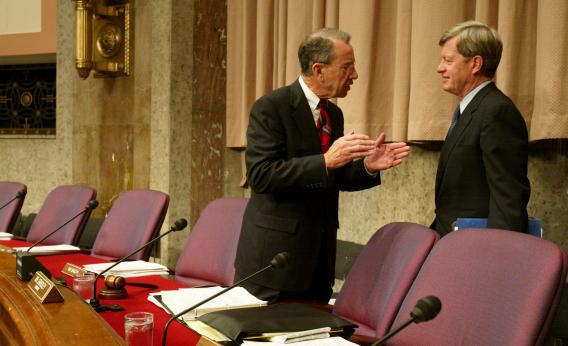Senate Finance Committee Chairman Max Baucus wrote an op-ed recently calling for revenue-neutral tax reform structured so as to maintain the progressivity of the current system. Detail-free tax reform plans are a dime a dozen so there’d be no real reason to care except that it was co-authored with Dave Camp of the House Ways and Means Committee. That sort of smacks of a bipartisan initiative that might actually happen. And the White House is none too pleased about it.
Senior administration officials say going down this road would be a mistake. Democrats are looking to raise net tax revenue from closing loopholes, and the White House thinks that a revenue neutral reform would undercut that entire process.
That said, while I certainly see why the administration looks askance at the Baucus effort it’s hard to see what they could do to stop him. If a bill passes the House of Representatives that makes the tax code more efficient, doesn’t cost any revenue, and doesn’t raise taxes on the middle class are Democrats really going to kill it? What would their reason for killing it even be? For example, you could cap the deductibility of any itemized deduction at the 28 percent level. Then you could use whatever revenue that raises to adjust the 39.6%, 35%, and 33% tax brackets. The administration wouldn’t consider the result of that kind of reform optimal tax policy—they think we need to reduce medium-term deficits in part through raising more revenue from high income families—but I have a hard time believing they wouldn’t see it as superior tax policy to the status quo.
The Center on Budget and Policy Priorities has previously described revenue neutral reform as a potential trap, in which rates ratchet downward but loopholes magically reappear in subsequent years. That sounds like a plausible strategic worry to me, just as the White House’s strategic worry sounds plausible. But in both cases, I think it would be hard in practice to hold the line on purely strategic grounds. What’s been keeping the administration out of the trap for the past several years is that Republicans have never committed to reform that preserves the progressivity of the tax code. Instead, mainstream GOP tax reform proposals have involved higher taxes on the middle class to finance rate cuts for the rich setting up a clash of class warfare budgets. But if Camp and Baucus are able to work out a compromise on the terms spelled out in their joint op-ed, a tactic concession by the GOP could equal a strategic win.
